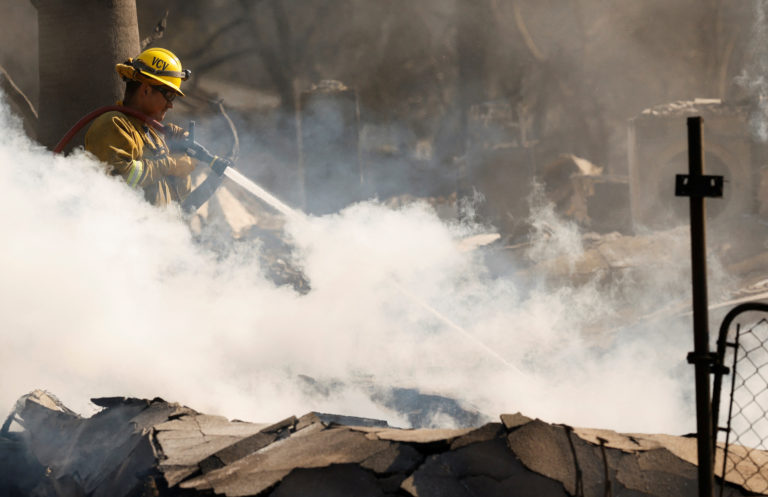President-elect Donald Trump was sentenced in New York, months after a jury found him guilty of 34 felony counts of falsifying business documents to cover up an extramarital affair. The judge granted Trump an unconditional discharge, a sentence that affirms he’s a convicted felon, but one where he will face no further penalties, fines or any time in jail. William Brangham reports.
Read the Full Transcript
Notice: Transcripts are machine and human generated and lightly edited for accuracy. They may contain errors.
-
Amna Nawaz:
President-elect Donald Trump was sentenced today in New York City months after a New York jury found him guilty of 34 felony counts, falsifying business documents to cover up an extramarital affair.
But Judge Juan Merchan granted the president-elect what's called an unconditional discharge, a sentence that affirms he is a convicted felon, but faces no further penalties, fines or any time in jail.
Our William Brangham was in court in New York this morning and joins us now.
So, William, tell us a little bit more about this unconditional discharge. How did Judge Juan Merchan explain his rationale for what some are calling a lenient, lenient sentence?
-
William Brangham:
I mean, Amna, on one hand, this wasn't a surprise. The judge had telegraphed this in a memo earlier.
But, yes, this is a relatively rare situation, to have a defendant convicted of 34 felony convictions and face no jail time, no penalties, no fines, no probation. Merchan, in describing today, said that, on one hand, this was a trial that was very ordinary. It unfolded in an ordinary way. Jury was selected. Judges — I mean, the lawyers gave their arguments. Witnesses were heard. A verdict was reached.
But, he said, because of the defendant, this was an extraordinary trial, and sentencing him would be the same. Merchan said that, if Donald Trump had been a regular citizen, a regular defendant, that he would have likely have faced much harsher punishment for those crimes.
But because Donald Trump is about to become president of the United States again, that comes with the enormous protections, the judge said. Those are granted by the Constitution, many other courts, and most recently interpreted again by the Supreme Court last year.
So Merchan argued this was the only course he could really take. But he did say those protections given to the president do not excuse the underlying crime. Let's hear a little bit of what he said today.
-
Judge Juan Merchan, New York Supreme Court Justice:
To be clear, the protections afforded the office of the president are not a mitigating factor. They do not reduce the seriousness of the crime or justify its commission in any way. The protections are, however, a legal mandate, which, pursuant to the rule of law, this court must respect and follow.
-
Amna Nawaz:
Interesting clarification there.
And, William, we should note that Mr. Trump wasn't in the courtroom today. The judge had given him the option of dialing in remotely, but he was allowed to speak and on the record. So what did he say?
-
William Brangham:
That's right.
Donald Trump connected to the courtroom via video link from Mar-a-Lago sitting next to his lawyer. And Trump said what he has always said about this case, that this was a political witch-hunt, is a completely rigged case against him. He said he is completely innocent of the charges, which he argues are completely bogus. He denies he ever had a relationship with Stormy Daniels.
He again falsely blamed collusion between these local prosecutors and the Department of Justice. He said, notably, that the voters had been the ultimate jury nationwide and that they had looked at this case and all the other cases against him, and they said they have vindicated him. Here's a little bit of what he had to say.
Donald Trump, Former President of the United States (R) and Current U.S. President-Elect: It's been a political witch-hunt. It was done to damage my reputation so that I'd lose the election. And, obviously, that didn't work.
-
Amna Nawaz:
But, William, even facing no penalties, no jail time, no fines, this isn't necessarily a day that Mr. Trump wanted to see happen or thought should happen. Isn't that right?
-
William Brangham:
That's exactly right.
He fought this in every legal avenue that he could, as is his right. He appealed it to this judge. He appealed it to an appeals court in New York. He even appealed it this week to the U.S. Supreme Court, which rejected it last night in a 5-4 vote.
There was also this very unusual phone call that Donald Trump had with Supreme Court Justice Samuel Alito this week. Ostensibly, this was a call about a job referral for a man who is I guess being considered for a job in the Trump administration. But many government ethics experts say that to have the a sitting Supreme Court justice on the phone with the president-elect on the very same week that he is appealing to them to delay sentencing certainly raises eyebrows.
Again, Alito claims that they did not talk about this whatsoever. It had not even been filed at that point when Trump had this conversation.
So, yes, Trump did not want today to come, because, until today actually happened, Trump was not legally considered a — quote — "convicted felon," and now he is. And that's certainly not any label that an incoming president wants affixed to him right before he enters the White House.
The last thing that Judge Merchan said to Donald Trump today was: "Sir, I wish you Godspeed as you assume your second term in office."
And with that, Donald Trump's video link disconnected from the courtroom, and that was the end of the day today.
-
Amna Nawaz:
Godspeed, indeed.
William Brangham reporting from New York City.
William, thank you.
-
William Brangham:
Thanks, Amna.







